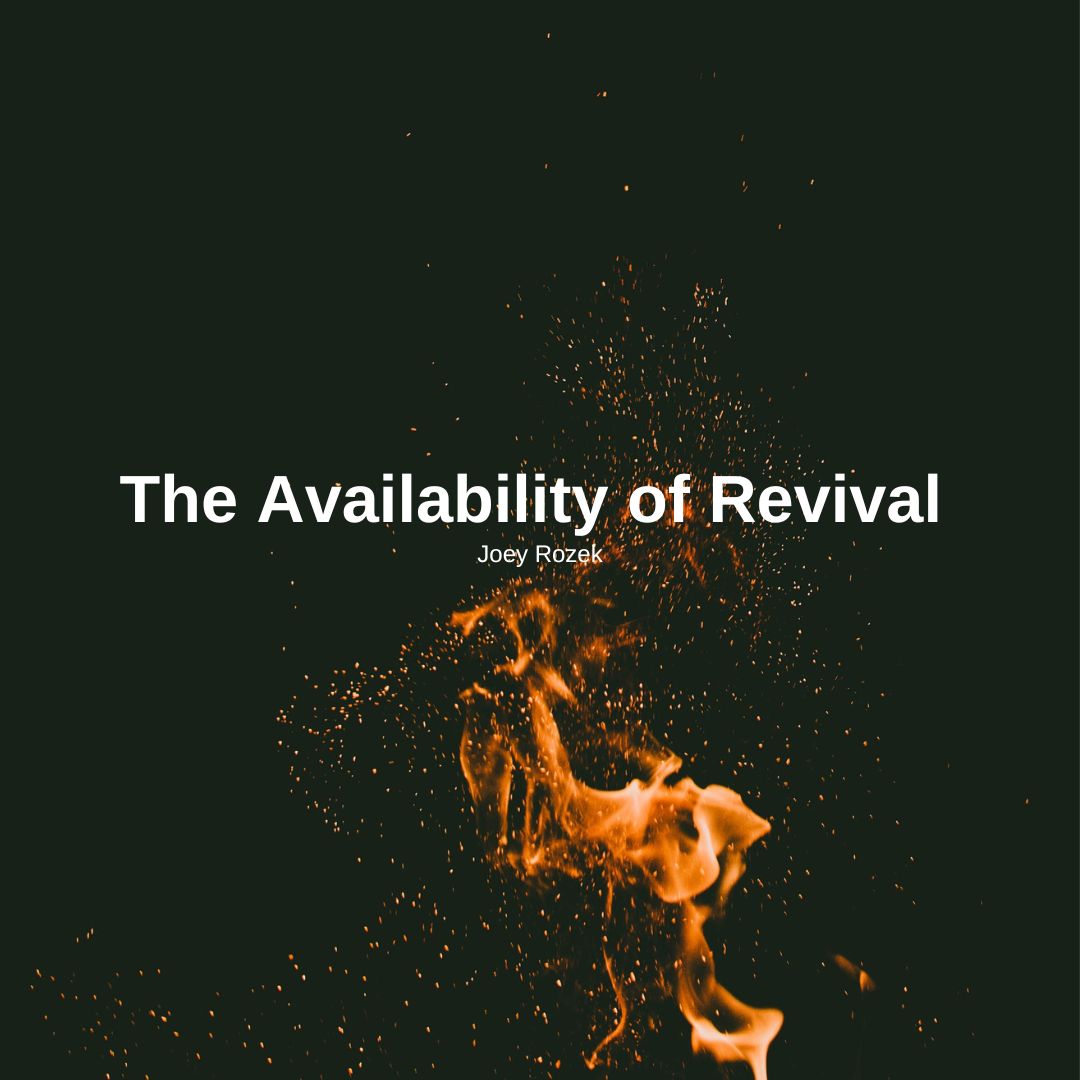
Do we see revival taking place today?
Before you consider answering such a question, it is important to begin your examination with YOU. On the one hand, only you can affirm that revival is taking place in your own heart. On the other hand, revival on a large scale eventually becomes so undeniable that both culture and history are impacted by God’s mercies falling—and will acknowledge as such. During a time of true revival, the very presence of God’s Holy Spirit and ongoing grace become so tangible that waves of humility and holiness wash over hardened hearts and lost souls. Supernatural healings and breakthroughs are reported, and those who are bound up by sin and heaviness are loosed and cleansed as God tenderly softens, saves, and sanctifies His people. Historically, revival has been an experiential, spontaneous work of God that defies time, daily routines, and spiritual ruts.
However, not all who say, “Revival, Revival” will experience authentic transformation in their lives. Therefore, I would like to present a few observations and biblical considerations about what has been going on during the recent awakenings at Asbury University (and on other college campuses) and then present a form of revival that remains available and accessible to all who have put their trust in Christ.
The very natural, non-hype flow of prayer, worship, repentance, open Bible readings, and testimonies that has been continually taking place in the Hughes Auditorium at Wilmore, Kentucky’s Asbury University certainly falls in line with the biblical priorities and patterns of the early disciples following Pentecost.[1] One key observation that should be noted is that one of the major distinctions between these revival meetings and any given Sunday morning worship service might just come down to the issue of TIME.
These college gatherings reveal a willingness to linger longer in God’s presence—without the need to cling so strongly to the clock—which is often the ruling factor in most modern Western services. Although some have noted a scarcity of strong biblical teaching and preaching during these meetings, it should be recognized that God will often send His Spirit in certain ways, and at various times, to tenderize hearts so that people might be able to “receive with meekness the implanted word which is able to save souls” (James 1:21).
A personal revival is often waiting for the believer, or local church assembly, willing to tarry in the presence of God and allow time to stand still. God may be reminding us of the joy intrinsic in both grace-filled AND time-stilled experiences with Him, experiences that are always available to those who hunger and thirst for righteousness.
Are you willing to make time in your schedule for a time of spiritual revival and renewal?
One of the greatest revivals to be recorded in Scripture is found in the Old Testament and took place unexpectedly in the very self-indulgent capital city of Assyria. Here, the lost souls of Nineveh responded to Jonah’s preaching—and repented for a period of 40 straight days. If we move over to the New Testament, we see a willingness by those in the upper room during Pentecost to wait on the Lord in prayer for an unbroken period of ten days. Thus, a very practical reality in times of revival seems to be a recurring factor: revival takes time. People respond to God by laying down their self-focused lives and their routined schedules to spend extended time in the presence of God.
A true revival may well start in a moment of time somewhere, but it will also usually last for an extended period of time and will widen and spread like a wildfire. Thus, just like a farmer who sows seeds must wait for crops to appear, it may be premature to give any official title to what is happening during the beginning sprouts of revival without seeing its lasting fruit. Still, we can certainly rejoice that God is stirring hearts and producing a hunger and thirst for righteousness, a hunger and thirst that is beginning to grow and expand—like wildfire.
When the nation of Israel was divided and devoted to everything but God, the prophet Hosea declared the following, clearly recognizing the extended period of time involved:
Sow for yourselves righteousness; Reap in mercy; Break up your fallow ground,
For it is time to seek the LORD, Till He comes and rains righteousness on you.
(Hosea 10:12 NKJV, emphasis mine)
Or, as I like to put it, we need to take time to make time for the One who made time … otherwise, we could end up wasting the time that God has given to us.
It is interesting to note that Paul records there were over 500 eyewitnesses that saw the resurrected Christ at one time,[2]but there were only 120 that gathered in the upper room at Pentecost. The other 380-plus people did not take time to join the disciples in the upper room. Why? The Bible does not give us an answer, but it is an interesting point to consider nonetheless.
As I write this, I hear thunderous sounds emanating from the ceiling of my office in New Jersey. Although I am hearing rain and hail pouring down, it is hitting the roof of our church building; I am not experiencing the rain directly since it is falling outside of my environment. In this case, I am on the inside, thankfully missing out on what is happening outside. But when it comes to revival, one must ask, “Am I on the outside looking in when it comes to the actual outpouring of the Spirit that is taking place?”
Leonard Ravenhill once said, “The only reason we don’t have revival is because we are willing to live without it.”[3]
I wonder if this might be true for many people today who are mere spectators or commentators regarding the ongoing workings of God. If so, it is a good idea to ask yourself if you are willing to prepare for the rains of revival in your own heart. Now, if you are a critic or a skeptic whenever the word “revival” comes up, let me add there is something biblical in having some holy hesitation, especially since we were warned by Jesus to “take heed that no one deceives you” (Matt. 24:4), by the Apostle John “to test the spirits” (1 John 4:1), and by Paul “to test all things and hold fast what is good” (1 Thes. 5:21).
We do not want to be overly critical of heart, but we also should not freely embrace all that is done in the name of revival, both since we cannot know what God might be doing or preparing in the hearts of others. The Bereans were aptly commended in Scripture for being willing to receive the word “with all readiness” and yet they “searched the Scriptures daily to find out whether these things were so” (Acts 17:11). Thus, we ought to be open to what God desires to teach us about both the explanation and the experience of revival—while at the same time making sure that it measures up to what God has revealed about Himself and His ways throughout Scripture.
So, what does the word revival actually mean, from a biblical perspective?
Considering Christ finished the work of salvation and then committed His Spirit to the Father, we see that revival is the outpouring of His Spirit in the lives of His people whenever there is true repentance and faith. In one sense, revival is the ongoing reality of the New Covenant, where the old life is replaced by a new life in Christ and we are controlled by the Spirit. Thus, revival is the life of Jesus poured into our hearts in a new and living way as we, God’s people, realign with God’s heart.
The great London preacher Dr. Martin Lloyd-Jones once said, “It is generally agreed that the best way of defining a revival is to say that it is the church returning to the book of Acts, that it is a kind of repetition of Pentecost. It is the Spirit being poured out again upon the church. And this, of course, is a very vital and essential bit of doctrine.”[4]
The only use of the word “revival” in most English translations of the Bible is found in the book of Ezra, where those who were taken captive in Babylon had returned to God and to the holy city of Jerusalem, where they then began to experience a fresh supply of God’s grace.
And now for a little while grace has been shown from the LORD our God, to leave us a remnant to escape, and to give us a peg in His holy place, that our God may enlighten our eyes and give us a measure of revival in our bondage. For we were slaves. Yet our God did not forsake us in our bondage; but He extended mercy to us in the sight of the kings of Persia, to revive us, to repair the house of our God, to rebuild its ruins, and to give us a wall in Judah and Jerusalem. (Ezra 9:8-9, emphasis mine)
The word revival in Hebrew is the word “mihya” which means a preserving of life, a quickening of living flesh, or a recovering of self (or in this case, of God’s house). The same word is used in Leviticus to describe the appearance of a spot on raw flesh that a priest could examine to see whether someone was truly unclean or not.[5] Since there have been many false revivals throughout history that were not biblically grounded or “clean,” it is right to not be hasty in assuming that all named revivals are authentic. But let us also take care that we are prayerful in our analysis, properly examining what is taking place, and ask God to search our hearts before we attempt to declare something clean or unclean.
This same Hebrew word for revival was first used in Scripture when Joseph revealed his true identity to his brothers, who betrayed him and sold him into Egypt. Although his brethren did not recognize him in their first coming to see him, Joseph was ready to reveal who he was during their second coming (which has great implications for the nation of Israel in the last days) and explained that God sent him before them “to preserve life” (or bring a revival of sorts).
And Joseph said to his brothers, “Please come near to me.” So they came near. Then he said: “I am Joseph your brother, whom you sold into Egypt. But now, do not therefore be grieved or angry with yourselves because you sold me here; for God sent me before you to preserve life. (Genesis 45:4-5, emphasis mine).
The Lord sent Joseph ahead to fulfill His promise and save many through him. God did something similar when, in order to accomplish one of the greatest revivals recorded in Scripture, He sent Jonah to Nineveh. Yet Jonah, knowing that God’s nature was to be merciful before sending judgment, stubbornly got onto a boat headed in the opposite direction. But God accomplished His purpose anyway by humbling Jonah in the belly of a large fish and then spitting him out—in the direction of Nineveh.
Similarly, God will sovereignly send revivals to undeserving people whenever He chooses, but we also know that God loves to give grace to the humble. When God sees the lowly posture of true repentance, “times of refreshment often come from the presence of the Lord” (Acts 3:19, emphasis mine). In the biblical roots of revival, it is less about outward manifestations and more about inward transformation, and it is never reduced or limited to a geographical location. Rather, it is available for all those hungry and thirsty for more of God, since He is still seeking true worshippers who will worship Him in spirit and in truth.
Finally, how can we make ourselves available for the revival that is always available to us?
Paul the Apostle gives us a really good starting point. When he preached at the Areopagus (Mars Hill) to a people who sought to worship and please every deity they could think of, Paul noticed an altar inscribed “to an unknown god.” Therefore, he proclaimed that “they should seek the Lord, in the hope that they might grope for Him and find Him, though He is not far from each one of us …” (Acts 17:27, emphasis mine).
Here are some key principles apropos to posturing ourselves for revival—since He is near to us all:
- Take time to diligently seek the Lord … and He will reward us. (Heb. 11:6)
- Humble yourselves under His mighty right hand … and He will exalt us. (1 Peter 5:6)
- Confess your sins one to another … that you might be healed. (James 5:16)
- Dwell together in the unity of the Spirit … that God might command the blessing. (Psalm 133)
- Pray honestly, fervently, and effectively … and it will avail much. (James 5:16)
- Be still and know that He is God … and you will see Him exalted in the earth. (Psalm 46:10)
- Come to Jesus … and He will give rest for your souls. (Matt. 11:28-29)
Jesus is presently calling us to come to Him to find continual rest for our weary and heavy-laden souls. Jesus described this rest not as something sitting dormant in our souls but as the ongoing work of His Spirit in our lives. Recall when Jesus invited all those who had heard Him preach on the last day of the Feast of Tabernacles to receive His living water—which would then flow from their lives like living springs bubbling out from deep recesses.
On the last day, that great day of the feast, Jesus stood and cried out, saying, “If anyone thirsts, let him come to Me and drink. He who believes in Me, as the Scripture has said, out of his heart will flow rivers of living water.” (John 7:37-38)
We do not need to be seeking the arrival of revival as much as we need the survival of revival.
As Jesus instructed the church of Ephesus after explaining they had left their first love: “Remember therefore from where you have fallen; repent and do the first works” (Rev. 2:5). Revival is always available because although you may have left your first love, your first love has never left you.
In the final analysis, do not just read about God’s great works or discuss what God is or is not doing today. Instead, let us remember how God desired to feed the wandering children of Israel “with the finest of wheat” and would have satisfied them “with honey from the rock” if they, His people, would simply listen to Him, open wide their mouths, and walk in His ways (Psalm 81:10-16).
As a man after God’s own heart once said, “O, taste and see that the Lord is good.”
… and then you will know that revival has indeed come … at least in your own heart.
___________________________________________________________________________________________________
References
[1] See Acts 2:42-47
[2] 1 Corinthians 15:6
[3] Leonard Ravenhill, Why Revival Tarries, Expanded Edition (Bloomington: Bethany House Publishers, 2004).
[4] Dr. Martin Lloyd-Jones, Joy Unspeakable: Power & Renewal in the Holy Spirit (Wheaton: Shaw Books, 2000) 38.
[5] See Leviticus 13:10, 24







